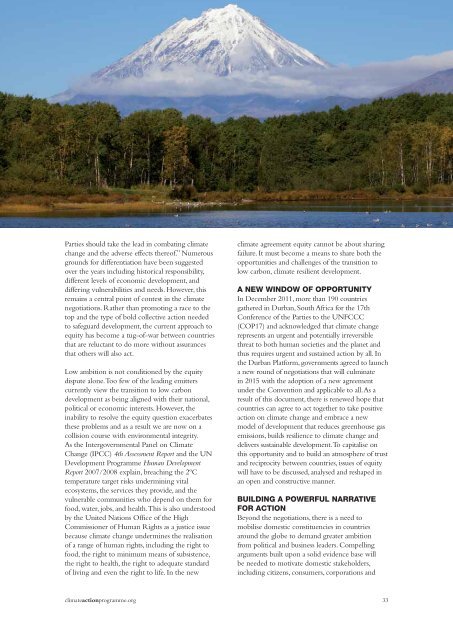Climate Action 2012-2013
You also want an ePaper? Increase the reach of your titles
YUMPU automatically turns print PDFs into web optimized ePapers that Google loves.
POLICY, GOVERNANCE AND FINANCE<br />
Parties should take the lead in combating climate<br />
change and the adverse effects thereof.” Numerous<br />
grounds for differentiation have been suggested<br />
over the years including historical responsibility,<br />
different levels of economic development, and<br />
differing vulnerabilities and needs. However, this<br />
remains a central point of contest in the climate<br />
negotiations. Rather than promoting a race to the<br />
top and the type of bold collective action needed<br />
to safeguard development, the current approach to<br />
equity has become a tug-of-war between countries<br />
that are reluctant to do more without assurances<br />
that others will also act.<br />
Low ambition is not conditioned by the equity<br />
dispute alone. Too few of the leading emitters<br />
currently view the transition to low carbon<br />
development as being aligned with their national,<br />
political or economic interests. However, the<br />
inability to resolve the equity question exacerbates<br />
these problems and as a result we are now on a<br />
collision course with environmental integrity.<br />
As the Intergovernmental Panel on <strong>Climate</strong><br />
Change (IPCC) 4th Assessment Report and the UN<br />
Development Programme Human Development<br />
Report 2007/2008 explain, breaching the 2ºC<br />
temperature target risks undermining vital<br />
ecosystems, the services they provide, and the<br />
vulnerable communities who depend on them for<br />
food, water, jobs, and health. This is also understood<br />
by the United Nations Office of the High<br />
Commissioner of Human Rights as a justice issue<br />
because climate change undermines the realisation<br />
of a range of human rights, including the right to<br />
food, the right to minimum means of subsistence,<br />
the right to health, the right to adequate standard<br />
of living and even the right to life. In the new<br />
climate agreement equity cannot be about sharing<br />
failure. It must become a means to share both the<br />
opportunities and challenges of the transition to<br />
low carbon, climate resilient development.<br />
A NEW WINDOW OF OPPORTUNITY<br />
In December 2011, more than 190 countries<br />
gathered in Durban, South Africa for the 17th<br />
Conference of the Parties to the UNFCCC<br />
(COP17) and acknowledged that climate change<br />
represents an urgent and potentially irreversible<br />
threat to both human societies and the planet and<br />
thus requires urgent and sustained action by all. In<br />
the Durban Platform, governments agreed to launch<br />
a new round of negotiations that will culminate<br />
in 2015 with the adoption of a new agreement<br />
under the Convention and applicable to all. As a<br />
result of this document, there is renewed hope that<br />
countries can agree to act together to take positive<br />
action on climate change and embrace a new<br />
model of development that reduces greenhouse gas<br />
emissions, builds resilience to climate change and<br />
delivers sustainable development. To capitalise on<br />
this opportunity and to build an atmosphere of trust<br />
and reciprocity between countries, issues of equity<br />
will have to be discussed, analysed and reshaped in<br />
an open and constructive manner.<br />
BUILDING A POWERFUL NARRATIVE<br />
FOR ACTION<br />
Beyond the negotiations, there is a need to<br />
mobilise domestic constituencies in countries<br />
around the globe to demand greater ambition<br />
from political and business leaders. Compelling<br />
arguments built upon a solid evidence base will<br />
be needed to motivate domestic stakeholders,<br />
including citizens, consumers, corporations and<br />
climateactionprogramme.org 33












